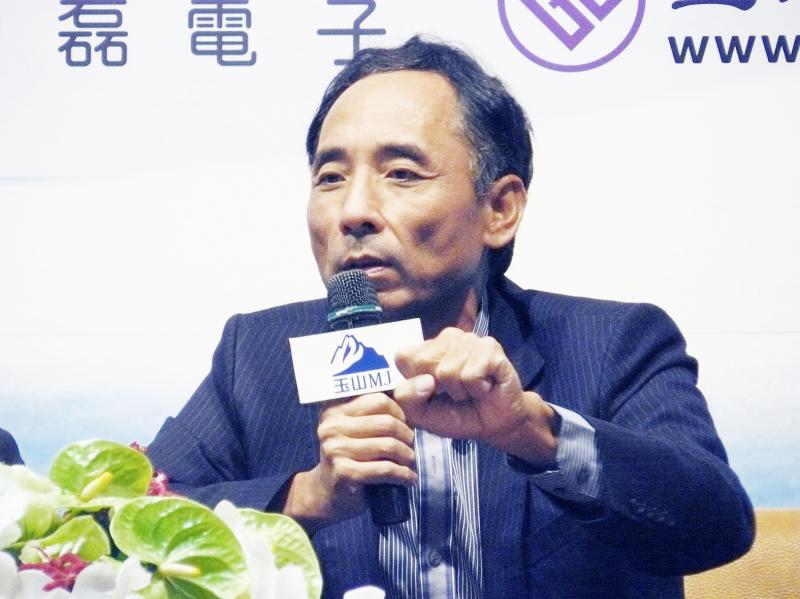Former Nanya Technology Corp (南亞科技) president Charles Kau (高啟全) has reportedly quit his job at China’s Tsinghua Unigroup Ltd (清華紫光) after his five-year contract expired.
Kau joined Tsinghua Unigroup in 2015 after retiring from Nanya Technology, the biggest DRAM chipmaker in Taiwan.
He was the first top executive from a Taiwanese memorychip maker to join a Chinese firm financially backed by Beijing, and had raised concern that he would help China catch up with Taiwan in building its memorychip industry.

Photo: CNA
Last year, Tsinghua Unigroup appointed Kau as chief executive officer of its newly formed unit, Yangtze Memory Technology Corp (長江存儲), aiming to develop and produce China’s first 3D NAND flash memory chips.
Yangtze Memory last month announced that its latest 128-layer 3D NAND flash memory chips have been adopted by customers for their solid-state-drive (SSD) products, according to a statement posted on its Web site.
Kau confirmed that he did not renew his contract with Tsinghua Unigroup when it expired, Central News Agency reported yesterday.
The report quoted Kau as saying that he had completed his mission at the firm and had decided to pursue his own career, declining to reveal his next move.
Kau could not be reached by the Taipei Times for comment as of press time yesterday.
Kau helped found Nanya Technology in 1995. Prior to joining Nanya, he worked at Taiwan Semiconductor Manufacturing Co (台積電), Intel Corp, Fairchild Semiconductor International Inc and Macronix International Co (旺宏電子).
In June, he was tapped by Wiwynn Corp (緯穎科技) to serve as an independent board director at the company, a subsidiary of Wistron Corp (緯創).
Wiwynn supplies cloud-based servers and solutions to global data center operators, such as Facebook Inc and Amazon.com Inc.

Taiwan’s technology protection rules prohibits Taiwan Semiconductor Manufacturing Co (TSMC, 台積電) from producing 2-nanometer chips abroad, so the company must keep its most cutting-edge technology at home, Minister of Economic Affairs J.W. Kuo (郭智輝) said yesterday. Kuo made the remarks in response to concerns that TSMC might be forced to produce advanced 2-nanometer chips at its fabs in Arizona ahead of schedule after former US president Donald Trump was re-elected as the next US president on Tuesday. “Since Taiwan has related regulations to protect its own technologies, TSMC cannot produce 2-nanometer chips overseas currently,” Kuo said at a meeting of the legislature’s

GEOPOLITICAL ISSUES? The economics ministry said that political factors should not affect supply chains linking global satellite firms and Taiwanese manufacturers Elon Musk’s Space Exploration Technologies Corp (SpaceX) asked Taiwanese suppliers to transfer manufacturing out of Taiwan, leading to some relocating portions of their supply chain, according to sources employed by and close to the equipment makers and corporate documents. A source at a company that is one of the numerous subcontractors that provide components for SpaceX’s Starlink satellite Internet products said that SpaceX asked their manufacturers to produce outside of Taiwan because of geopolitical risks, pushing at least one to move production to Vietnam. A second source who collaborates with Taiwanese satellite component makers in the nation said that suppliers were directly

Top Taiwanese officials yesterday moved to ease concern about the potential fallout of Donald Trump’s return to the White House, making a case that the technology restrictions promised by the former US president against China would outweigh the risks to the island. The prospect of Trump’s victory in this week’s election is a worry for Taipei given the Republican nominee in the past cast doubt over the US commitment to defend it from Beijing. But other policies championed by Trump toward China hold some appeal for Taiwan. National Development Council Minister Paul Liu (劉鏡清) described the proposed technology curbs as potentially having

EXPORT CONTROLS: US lawmakers have grown more concerned that the US Department of Commerce might not be aggressively enforcing its chip restrictions The US on Friday said it imposed a US$500,000 penalty on New York-based GlobalFoundries Inc, the world’s third-largest contract chipmaker, for shipping chips without authorization to an affiliate of blacklisted Chinese chipmaker Semiconductor Manufacturing International Corp (SMIC, 中芯). The US Department of Commerce in a statement said GlobalFoundries sent 74 shipments worth US$17.1 million to SJ Semiconductor Corp (盛合晶微半導體), an affiliate of SMIC, without seeking a license. Both SMIC and SJ Semiconductor were added to the department’s trade restriction Entity List in 2020 over SMIC’s alleged ties to the Chinese military-industrial complex. SMIC has denied wrongdoing. Exports to firms on the list